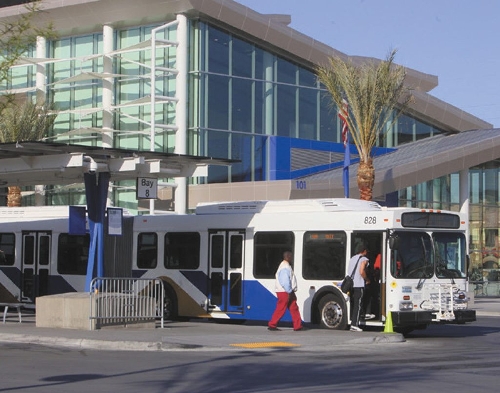A lot rides on transit contract

When political powerhouses swarm the Clark County Government Center, it is safe to predict that an issue involving a significant amount of money is on the table.
In this case, it is transportation provider First Transit trying to wrest the country’s largest public service contract away from Veolia Transportation, which has overseen the Regional Transportation Commission’s bus system and drivers since 1993.
"This is the most lobbying I’ve seen in 12 years," Regional Transportation Commission General Manager Jacob Snow said .
While the contract’s value fluctuates depending on route changes and fares, it hovers around $80 million per year. The contract is for three years and offers a pair of two-year extensions.
First Transit representatives said their bid for the seven-year contract was $50 million less than that submitted by Veolia.
On Thursday, the transportation commission postponed its decision on the contract until May, although no firm date was set. Commissioners want to see proof that First Transit can provide services at such a significantly lower cost.
Because of the huge disparity between bids, the transportation commission opted to hire financial analyst Jeremy Aguero to study the figures submitted by First Transit and determine whether the company can meet the requirements set out in the request for proposals.
"There is concern, and I think rightly so, that there is a vast disparity in the prices between these two companies to perform the services," Snow said. "What we’ve asked him (Aguero) to do is to get that outside look. It couldn’t be done in time, and that’s why we’ve asked for the delay."
Supporting First Transit are former U.S. Sen. Richard Bryan and former Clark County Commissioner Bruce Woodbury. Behind Veolia is high-powered political consultant Sig Rogich and attorney Chris Kaempfer.
union makes bullying claim
The heated battle for the contract took a new turn Thursday when leaders of the Amalgamated Transit Union Local 1637, which represents drivers and mechanics, told commissioners they were being bullied by Veolia officials.
"We are concerned and upset and ticked off," said Jose Mendoza, president of the union.
Veolia officials did not return messages for comment.
Snow is prohibited by law from interfering with labor issues between companies and their employees and therefore couldn’t comment on Mendoza’s claims of Veolia’s threats to union members.
"They’re quite stressed because they don’t know what (their) status is going to be," Snow said of the union employees. "As long as there is that uncertainty, the anxiety grows."
Mendoza said Veolia officials threatened to file a breach of contract complaint against the union and fire workers because representatives had met with First Transit and elected officials.
Union members are in a difficult situation because their contract with Veolia expired in December. Veolia’s contract with the Regional Transportation Commission ends in September.
Mendoza said meetings are perfectly appropriate after the agenda is released, which it was on April 7.
He said union members, who negotiate their contract with the transit operator, not the transportation commission, want a change in leadership.
"I get very offended," Mendoza said. "We are just doing what is in the best interest of members and doing it according to labor laws. They want a change."
Mendoza said Veolia officials demanded that he submit in writing who the union has met with about the contract.
"They want to know which politicians we’ve talked to, and that is none of their business," Mendoza said.
Aside from threatening the union with a breach of contract violation, Veolia officials have told drivers that if First Transit lands the contract, they will see a 30 percent cut in benefits and 11 percent cut in wages, according to Jeff Raske, union treasurer.
"We haven’t even negotiated a contract with First Transit yet, so there is no way of them possibly knowing what kind of benefits our bargaining unit would receive," Raske said.
most employees must stay
Snow said the company must retain the vast majority of current employees, maintain current salary and benefit levels or improve upon them. They must also be able to fulfill their maintenance responsibilities on the buses.
Terry Murphy, a consultant for First Transit, expected questions would arise about the transit contract and the company’s ability to offer such a low bid.
"Veolia is going to say they can’t do what they say they’re going to do," Murphy said last week. "We can do what we say we’re going to do."
Murphy said the company will do so by implementing new computer technology that essentially coaches drivers on habits that will conserve gasoline. That alone could save a half-million dollars a year, he said.
It also would offer the transportation commission a 1 percent discount if the company is paid at the beginning of the month rather than the end.
First Transit "didn’t look at what is existing; it wanted to look at what is better," Murphy said.
Contact reporter Adrienne Packer at apacker@reviewjournal.com or 702-387-2904.